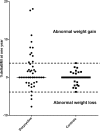Abnormal weight gain and gut microbiota modifications are side effects of long-term doxycycline and hydroxychloroquine treatment
- PMID: 24687497
- PMCID: PMC4068504
- DOI: 10.1128/AAC.02437-14
Abnormal weight gain and gut microbiota modifications are side effects of long-term doxycycline and hydroxychloroquine treatment
Retraction in
-
Retraction for Angelakis et al., "Abnormal Weight Gain and Gut Microbiota Modifications Are Side Effects of Long-Term Doxycycline and Hydroxychloroquine Treatment".Antimicrob Agents Chemother. 2024 Feb 7;68(2):e0150923. doi: 10.1128/aac.01509-23. Epub 2024 Jan 4. Antimicrob Agents Chemother. 2024. PMID: 38174939 Free PMC article. No abstract available.
Expression of concern in
-
Expression of Concern for Angelakis et al., "Abnormal Weight Gain and Gut Microbiota Modifications Are Side Effects of Long-Term Doxycycline and Hydroxychloroquine Treatment".Antimicrob Agents Chemother. 2022 Oct 18;66(10):e0078322. doi: 10.1128/aac.00783-22. Epub 2022 Sep 7. Antimicrob Agents Chemother. 2022. PMID: 36069591 Free PMC article. No abstract available.
Abstract
Doxycycline has been proposed for the treatment of malnourished children in developing countries, and its use has been associated with weight gain in healthy volunteers. No previous studies have assessed abnormal weight gain as a putative side effect of long-term doxycycline treatment; thus, the objective of the present study was to characterize this phenomenon. We also analyzed the role of the gut microbiota in this effect. We assessed changes in the body mass index in Q fever endocarditis patients treated with doxycycline and hydroxychloroquine and healthy individuals with no antibiotic treatment. Abnormal weight gain was defined as a gain in weight above that of the controls. The fecal samples were examined using molecular assays for Methanobrevibacter smithii, Bacteroidetes, Firmicutes, Escherichia coli, Lactobacillus, Lactobacillus reuteri, and total bacterial concentrations. We examined 82 patients, including 48 patients with Q fever endocarditis and 34 controls. Approximately 23% of the treated patients showed abnormal weight gain (P = 0.001). Patients treated with doxycycline and hydroxychloroquine presented significantly lower concentrations of Bacteroidetes (P = 0.002), Firmicutes (P = 0.01), and Lactobacillus (P = 0.02). The linear regression analysis revealed that the duration of treatment was significantly associated with a decrease in Bacteroidetes (P = 0.0001), Firmicutes (P = 0.002), and total bacteria (P < 0.00001). Abnormal weight gain is a side effect of long-term doxycycline and hydroxychloroquine treatment. Gut microbiota modifications at the phylum level could play an instrumental role in this effect. We highlight the need for specific nutritional care in patients undergoing long-term antibiotic treatment, particularly treatment involving the use of doxycycline.
Copyright © 2014, American Society for Microbiology. All Rights Reserved.
Figures


References
-
- Bartosch S, Fite A, Macfarlane GT, McMurdo ME. 2004. Characterization of bacterial communities in feces from healthy elderly volunteers and hospitalized elderly patients by using real-time PCR and effects of antibiotic treatment on the fecal microbiota. Appl. Environ. Microbiol. 70:3575–3581. 10.1128/AEM.70.6.3575-3581.2004 - DOI - PMC - PubMed
Publication types
MeSH terms
Substances
LinkOut - more resources
Full Text Sources
Other Literature Sources

